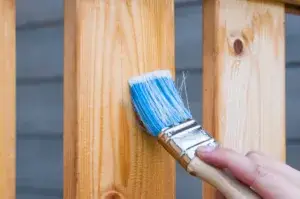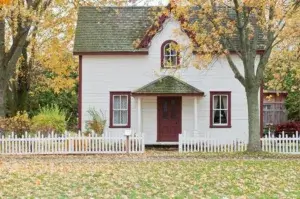Vinyl vs. Wood Fencing: Choosing the Perfect Fence for Your Property
Selecting the correct type of fencing for your property is essential to achieve a perfect blend of aesthetics, security, and functionality. Wood and vinyl are two popular materials that homeowners often consider for their fencing needs. This comprehensive guide will explore the key differences between wood and vinyl fencing, empowering you to make an informed decision that meets your requirements.
Durability and Maintenance
Wood Fencing: The Timeless Elegance
Wood fencing has stood the test of time, known for its timeless elegance and natural charm. The durability of wood fencing primarily depends on the type of wood chosen, with options such as cedar and redwood offering increased resistance to rot and decay.

To maintain the longevity of a wood fence, regular maintenance is crucial. This includes applying sealants, stains, or paints to protect it from the elements. Inspecting the fence for warped boards or loose nails and addressing any repairs promptly is essential to prevent further deterioration.
Vinyl Fencing: The Low-Maintenance Marvel
Vinyl fencing has gained popularity recently due to its exceptional durability and low maintenance requirements. Crafted from synthetic materials like PVC (polyvinyl chloride), vinyl fences exhibit remarkable resistance to rot, pests, moisture, and sunlight.

One of the significant advantages of vinyl fencing is its minimal maintenance. Unlike wood, it doesn’t demand painting, staining, or sealing. A simple cleaning with mild detergent and water is typically sufficient to keep it looking pristine for years. Vinyl fences are hassle-free for busy homeowners seeking an enduring and visually appealing option.
Aesthetics and Customization
Wood Fencing: Natural Beauty and Versatility
Wood fences are celebrated for their unparalleled natural beauty and versatility. They seamlessly blend with various architectural styles, exuding a warm and timeless appeal. With a range of wood types such as pine, cedar, and redwood available, you can choose the one that perfectly complements your desired aesthetic.
Wood fencing offers abundant customization options. Whether you prefer the classic charm of a picket fence or the privacy provided by a solid wood design, wood fences allow you to tailor the style to your needs. Furthermore, the option to paint or stain the wood enables you to match it with your existing colour scheme, adding a personalized touch to your property.
Vinyl Fencing: Style and Simplicity Combined
While vinyl fencing may not possess the natural rustic appeal of wood, it offers its distinct advantages in terms of aesthetics. Vinyl fences are available in an extensive array of colours, textures, and styles, including options that mimic the look of wood grains. This allows you to achieve the desired appearance without compromising on maintenance concerns.
The uniformity of vinyl panels ensures a consistent and sleek look throughout your fence line. With design options such as lattice tops, scalloping, or decorative post caps, you can further customize your vinyl fence to suit your taste and elevate the overall curb appeal of your property. Explore the stunning possibilities of vinyl fence styles here.
Cost Considerations
Wood Fencing: Affordability and Long-Term Expenses
Wood fencing generally offers a more affordable upfront cost compared to vinyl fencing. The total expense, however, depends on factors such as the type of wood, fence height, and design complexity. Considering the long-term costs associated with wood fencing, including maintenance, repairs, and eventual replacement, is essential.
Wood fences require regular upkeep, which can accumulate costs over time. Factors such as your area’s climate and wood quality can impact maintenance frequency and expenses. Additionally, wood fences have a limited lifespan compared to vinyl, which may necessitate replacement sooner than anticipated.
Vinyl Fencing: Long-Term Savings and Value
Despite a potentially higher initial investment, vinyl fencing offers significant long-term savings and value. Once installed, a vinyl fence typically requires minimal repairs, painting, or staining, translating into time and cost savings for homeowners.
The longevity and durability of vinyl fences make them a cost-effective choice over time. With reduced maintenance expenses and the assurance provided by warranties from reputable vinyl fencing manufacturers, you can have peace of mind knowing that your investment will stand the test of time. Explore the benefits of vinyl fence styles here.
Environmental Impact
Wood Fencing: Natural Origins and Considerations
Wood fencing is often considered an environmentally friendly choice due to its natural origins. However, the environmental impact depends on various factors, including the sourcing and harvesting practices of the wood. Opting for sustainably sourced wood, such as Forest Stewardship Council (FSC)-certified products, can help minimize adverse ecological effects.
It’s important to note that wood fences require the regular application of sealants and finishes, which may contain chemicals potentially harmful to the environment. A wood fence’s eventual replacement and disposal also contribute to waste accumulation.
Vinyl Fencing: Recyclability and Sustainable Practices
Vinyl fencing offers both environmental advantages and considerations. Vinyl fences are typically made from recyclable materials, with many manufacturers incorporating recycled content into their products. This contributes to waste reduction and the conservation of natural resources.
However, the manufacturing process of vinyl fencing involves the use of chemicals, including PVC. While advancements have been made to improve the sustainability of PVC production, it is still considered an environmentally contentious material. By selecting vinyl fences from manufacturers committed to sustainable practices, you can help mitigate potential negative impacts on the environment.
Conclusion
Selecting the ideal fence for your property involves carefully considering factors such as durability, maintenance requirements, aesthetics, costs, and environmental impact. Wood and vinyl fencing offer unique qualities and benefits, allowing you to choose one that aligns with your needs and enhances your property’s value and visual appeal.
Wood fencing emanates timeless elegance and customization options but requires regular maintenance and may entail higher long-term costs. Conversely, vinyl fencing provides a low-maintenance solution with remarkable durability and a wide range of styles. Although the upfront investment for vinyl fencing may be higher, its long-term benefits make it a cost-effective and visually appealing choice.
For more information on specific fence styles and options, we invite you to explore the following links:
- Wood Fence Styles
- Vinyl Fence Styles
- Decorative Metal Fence
- Chain Link Fence
- Dog Enclosure
- Pool Safety Fence
- Commercial & Industrial Fence
Visit our website to explore these options further and find the perfect fence that suits your property’s unique needs and enhances its overall allure.

